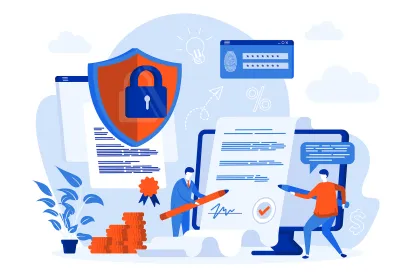Electronic signatures or e-signatures are an increasingly essential tool in today’s technology-dependent workplace, especially for employers that are hiring remote workers. While state and federal law generally recognizes e-signatures to be as valid as traditional written or “wet” signatures, there are certain disclosures and processes that are required that may be challenging for employers.
What Is an E-Signature?
When many think of e-signatures, they imagine using a mouse, a stylus, or their finger to sign a screen, but the legal definition of an e-signature includes a much broader set of actions, including digitally checking a box, a mouse click, or typing a name into a field. Notably, the federal Electronic Signatures in Global and National Commerce Act (E-SIGN Act) defines an e-signature as “an electronic sound, symbol, or process, attached to or logically associated with a contract or other record and executed or adopted by a person with the intent to sign the record.”
Employers are using e-signatures for executing hiring documents, acknowledging arbitration agreements, and establishing the receipt of employee handbooks and workplace policies. Many in today’s workforce are likely accustomed to using e-signatures in a number of contexts, but there are certain legal requirements for the use of e-signatures that would ensure their validity in the face of potential employment disputes down the line.
The E-SIGN Act
The E-SIGN Act and state laws generally establish that e-signatures are valid and that companies can use them in reviewing and agreeing to documents electronically in the employment context. The E-SIGN Act, specifically, presumes that e-signatures are valid as if they were traditional “wet” signatures, unless the law otherwise states. In terms of state laws, 49 states have adopted a version of the model Uniform Electronic Transactions Act (UETA), establishing the validity of proper e-signatures, while New York State has its own e-signature law.
The E-SIGN Act requires certain disclosures to be made upfront for certain e-signatures to be valid. These include disclosures that the signer is agreeing to e-sign, how consent may be withdrawn, and implications for withdrawing consent, hardware and software requirements, and how to obtain paper copies, among other things. The required disclosures need to be made only once at the beginning of the relationship.
Proving Up an E-Signature
To ensure e-signatures are valid, employers may also think about using a process by which the employer discloses to an employee who is electronically signing a document that by taking a certain digital action (i.e., checking a box) that the employee is agreeing to something.
Another issue with e-signatures is the way in which they are proven if called into question. As with wet signatures, employers may not simply point to a print out of an e-signature to prove its validity. Employers may have to rely on indirect evidence to prove the validity of an e-signature, such as underlying digital data showing when an e-signature was made. Another example would be testimony from an individual within the company explaining the specific e-signature process to show how a signer would have been notified of the legal significance of making an e-signature.
Key Takeaways
State and federal laws generally allow employers to use e-signatures to review and sign documents electronically in the employment context. This can be essential for employers with more work communication being executed online, particularly with more employees working remotely or in offices that are remote from a company’s HR department. Employers may want to consider the various disclosure requirements under the federal E-SIGN Act and state laws and the ways in which e-signatures can be proven if they are called into question under federal and state law. Employers may further want to consider designating a point person within a company who can testify to the validity of e-signatures.






 />i
/>i

